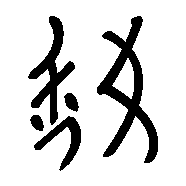
The story centers on Lily and Snow Flower, two life-long friends. Lily and Snow Flower use nu shu so that they can communicate in secret. However, like modern day e-mail, misunderstandings can arise about meaning. One such misunderstanding has a devastating impact on their relationship at a crucial time in their lives.
Here are a few interesting articles about Nu Shu:
Nu Shu Wikipedia article
The author's web page on writing Snow Flower
Nu Shu, a Women's script
Amazon.com reviews
Taken from the author's note at the back of the book:
"One day in the 1960's, and old woman fainted in a rural Chinese train station. When the police searched her belongings in an effort to identify her, they came across papers with what looked to be a secret code written on them. This being the height of the Cultural Revolution, the woman was arrested and detained on suspicion of being a spy. The scholars who came to decipher the code realized almost at once that this was not something related to international intrigue. Rather, it was a written language used solely by women and it had been kept a "secret" from men for a thousand years. Those scholars were promptly sent to labor camp."
The author also discusses how foot-binding continued in the rural areas of China up until 1951.
At age seven, a girl had her feet bound. (The ideal size was just three inches long when completed.) From that time until she married out to another village at age seventeen, she lived in an upstairs room with only one window. When she went to her husband's home, she spent the rest of her life in similar upstairs rooms, again with only one window from which to view the world.
The villages in the story are actual villages that still exist today. She also talks about two of the phrases Lily learns as she grows up, and how her Grandmother from China actually heard those phrases when she was a little girl: "When a girl, obey your father; when a wife, obey your husband; when a widow, obey your son." "Obey, obey, obey, then do what you want."
In short, I thought it was a fascinating read, and I highly recommend it!
**********************************************
Review From Publishers Weekly
See's engrossing novel set in remote 19th-century China details the deeply affecting story of lifelong, intimate friends (laotong, or "old sames") Lily and Snow Flower, their imprisonment by rigid codes of conduct for women and their betrayal by pride and love. While granting immediacy to Lily's voice, See adroitly transmits historical background in graceful prose. Her in-depth research into women's ceremonies and duties in China's rural interior brings fascinating revelations about arranged marriages, women's inferior status in both their natal and married homes, and the Confucian proverbs and myriad superstitions that informed daily life. Beginning with a detailed and heartbreaking description of Lily and her sisters' foot binding ("Only through pain will you have beauty. Only through suffering will you have peace"), the story widens to a vivid portrait of family and village life. Most impressive is See's incorporation of nu shu, a secret written phonetic code among women—here between Lily and Snow Flower—that dates back 1,000 years in the southwestern Hunan province ("My writing is soaked with the tears of my heart,/ An invisible rebellion that no man can see").



No comments:
Post a Comment